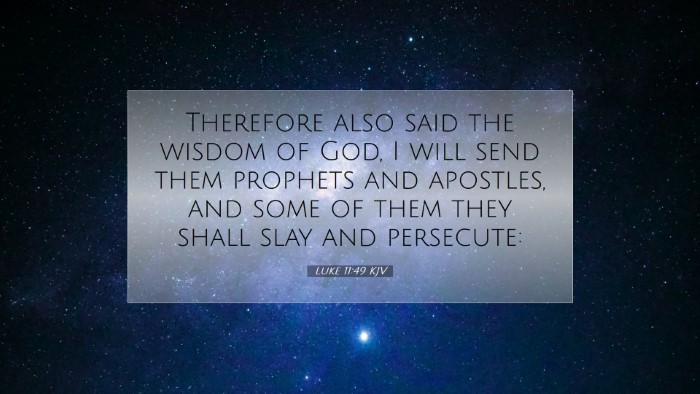Commentary on Luke 11:49
This verse is one that encapsulates the prophetic mission of God’s messengers and the rejection they often encounter, particularly in the context of Jesus' ministry and the broader biblical narrative.
Text of Luke 11:49
"Therefore also said the Wisdom of God, 'I will send them prophets and apostles, and some of them they will kill and persecute.'" (NKJV)
Historical Context
Luke 11:49 appears during a critical phase in Jesus' ministry in which He is directly confronting the religious leaders of His time. Understanding the historical backdrop—first-century Judea—helps illuminate the significance of this verse. Jesus speaks to a nation steeped in prophetic tradition, where rejection of the prophets is a recurring theme.
Matthew Henry's Commentary Insights
Wisdom of God: Henry points out that "the Wisdom of God" refers to Christ Himself, who embodies divine wisdom and knowledge. It implies that God’s plan for redemption has been in place throughout history.
Sending Prophets: Henry elaborates on the sending of prophets and apostles—individuals tasked with delivering God's messages to His people. This highlights God's persistent effort to reach out to humanity, showing His love and patience.
Prophetic Rejection: He notes that the fate of many prophets was grim—they faced persecution and death. This notion emphasizes the tragic reality of prophetic ministry, echoing Jesus’ own impending sacrifice and the hostile environment of His day.
Albert Barnes' Commentary Insights
Rejection of Holy Messengers: Barnes remarks that this verse serves as a prophetic declaration of the treatment that God’s messengers would receive. The phrase "some of them they will kill and persecute" points to the historical trend within Israel of rejecting and harming those sent by God.
Implication of Wisdom: He stresses that the phrase "Wisdom of God" not only indicates divine knowledge but also serves as a testament to the revelation of God’s will through servanthood, which contrasts sharply with human wisdom and pride.
Responsibility of the Listeners: Barnes urges that listeners must recognize their own responsibility in responding to divine truth, suggesting that rejecting God’s messengers inevitably leads to spiritual blindness and downfall.
Adam Clarke's Commentary Insights
Divine Provocation: Clarke suggests that God’s long-suffering nature is illustrated by His willingness to continue sending messengers despite their historical mistreatment. This reflects the depth of God's commitment to redeem His people.
Prophets and Apostles: Clarke draws a distinction between prophets of the Old Testament and apostles of the New Testament, indicating a progression of revelation and witness throughout biblical history.
Forewarning of Jesus' Destiny: Clarke notes that this verse serves as a precursor to the coming rejection of Christ Himself—a foreshadowing that sets the stage for Jesus’ own passion and sacrifice.
Theological Implications
God's Initiative: Luke 11:49 illustrates God's initiative in reaching out to humanity. The repeated sending of prophets and apostles signifies His unwavering desire for relationship and reconciliation.
Nature of True Wisdom: The mention of "the Wisdom of God" invites reflection on the nature of true wisdom, contrasting worldly understanding with divine revelation. It raises questions about our own reception of God's messages.
Rejection and Acceptance: This verse challenges believers to examine their openness to God’s call and the humility to heed His voice through various means, including scripture, prayer, and the Church.
Applications for Pastors and Theologians
- Faithfulness in Ministry: Understanding the rejection faced by prophets should encourage pastors to remain steadfast in their calling despite opposition or indifference.
- Encouragement to Encourage: Pastors must help their congregations recognize and appreciate the wisdom found in God's word and the messages through His servants.
- Spiritual Vigilance: This verse serves as a reminder for theologians and scholars to remain vigilant against the cultural pressures that may lead to the rejection of biblical truths.
Conclusion
Luke 11:49 encapsulates essential truths about the character of God, the nature of His prophetic messages, and the responsibilities of His followers. By drawing insights from these public domain commentaries, we gain a deeper understanding of not only this passage but also its application in illuminated faith. This verse challenges each generation to reflect on their relationship with God’s wisdom and their response to His messengers.


